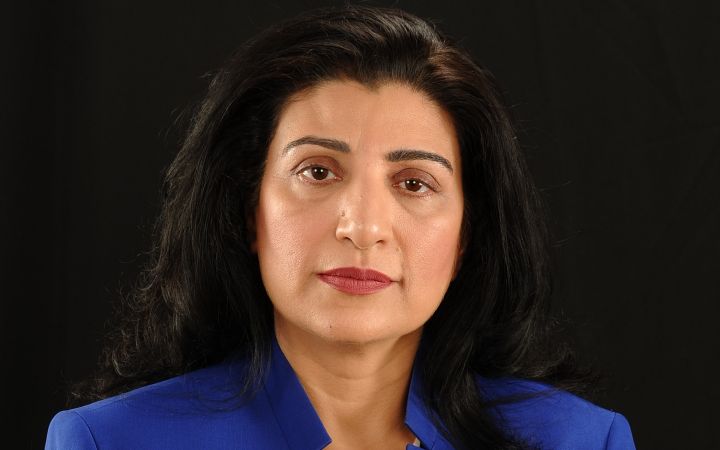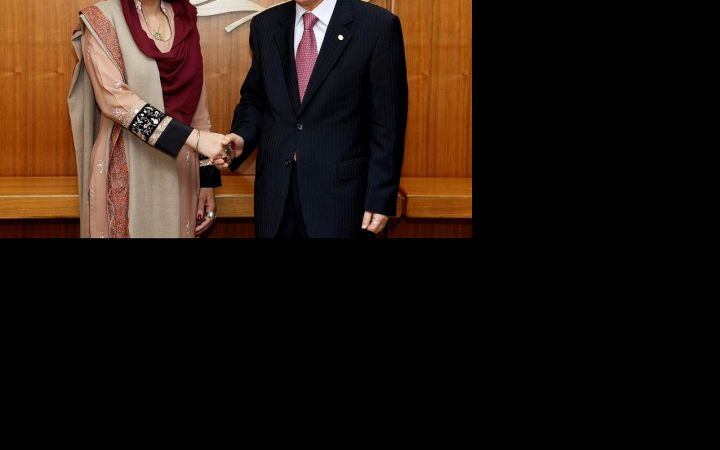Beneficiary: Farzana Raja
Title: Pakistani politician — Former Federal Minister, Ex-Member of the National Assembly of Pakistan and founding Chairpersons of the Benazir Income Support Programme (BISP)
Master: Oxford Brookes University (OBU) — UNITAR Master in Humanitarian Action and Peacebuilding
Few of us can confidently say that we have impacted the lives of millions like Farzana Raja has. She has accumulated over 20 years of experience as a Pakistani politician, as a Former Federal Minister and Ex-Member of the National Assembly of Pakistan, among other positions. Her younger self has never imagined that her passion for the humanitarian field would bring her so far in life. “I was a middle-class family child and during my upbringing, I saw many young people in my community whose parents struggled with paying their school fees, especially those for high education. I used to ask myself ‘what can I do to help people achieve their dreams?’, but at that time I didn’t have much exposure to the world and I didn’t know what to do”.
When she was at university, Farzana saw Benazir Bhutto become the first female prime minister of Pakistan and this fuelled Farzana with motivation to take real action. “As a woman and young leader, Bhutto would talk about women’s rights and youth and this inspired me”. After graduating from college, Farzana founded an NGO that offered scholarships to students having problems to keep up with their universities’ fees. Then, unexpectedly, she had the opportunity to meet Ms Bhutto in person, who was impressed by Farzana’s will to do more for others and extended to her a special invitation: to join her party and work on addressing social issues in the country. “This was a big breakthrough in my life and that was how I started my political career working for the underprivileged”.
Farzana’s career quickly developed and after six years she was elected to the Provincial Assembly of Punjab, one of the largest provinces in Pakistan, in a reserved seat for women, where she served for 5 years. She then ran for the National Assembly of Pakistan on a similarly reserved seat for women from Punjab, but a few days before the election day, Farzana’s life was shaken in a tragic turn of events. While accompanying Ms Bhutto at a political rally, shots were fired at the Prime Minister and a suicide bomb was detonated immediately after, killing Ms Bhutto and 24 other people. “I was devasted. She gave me a life opportunity and I saw her die in front of my very eyes along with other dear colleagues. This was a very traumatic experience for me”.
Farzana was in grief when she received the news about her election victory and she channelled it into founding what would become her life’s work: the Benazir Income Support Programme (BISP), the first ever social protection programme in the country, which was designed to alleviate poverty through women’s empowerment, grouping different social services under one umbrella. “A poverty assessment survey was done in the country with 27 million families responding to it. Cash transfers were delivered directly to the women participating in the programme for the first time in Pakistan through the bank accounts and debit cards given to them to eliminate third parties, so no one else would be involved in giving and taking the money. We offered vocational and technical training to develop their skills and make them gradually independent of the programme. The school fees of children would be covered to ensure their access to education and female entrepreneurs had the possibility to get loans to start their businesses”.
After so many years of work, Farzana felt the need to get more knowledge to support her endeavours, by combining experience with academia. “I needed to learn more in depth about humanitarian issues, peacebuilding and peacekeeping to see how I could contribute more meaningfully towards a peaceful and better future”. During her search, Farzana came across the Oxford Brookes University (OBU) — UNITAR Master’s in Humanitarian Action and Peacebuilding and decided to apply. “I looked at the modules and I was really excited to see it was a work-based and objective programme. I was also pleased that my geographical restrictions wouldn’t get in the way of learning because I could do it from anywhere in the world, so I would be able to stay with my family and children while pursuing this Master’s”.
Farzana was over the moon with the course and everything she was learning. “You know when you like something so much that you think of it all the time? This Master’s is like that for me. We learn about things that are happening right now in the world. I like the methodology as well, there are lots of discussions and experience-sharing among the participants and the experts delivering the modules. It feels like you’re actually working and living all over the world, benefiting from 100 years of experience by learning from them, so it’s very motivating”. She also enjoys going through all the essential and optional readings. “I used to look at things from an outside perspective. I would read many newspapers and reports, but I didn’t have such a diversified source of information to learn from”.
Farzana is particularly interested in the implications of conflict resolution.
“I always wondered why many conflicts happening around the world aren’t being managed and solved but I’ve never considered aspects such as conflict sensitivity and conflict transformation. Without a peacebuilding process there cannot be real conflict resolution. We must avoid that all the suffering is passed on to the next generations, affecting children physically, mentally and economically in a vicious cycle”.
She also said that what she knows now would’ve come in handy in the past. “I recall one time we had a problem of internal displacement in a province on the border with Afghanistan. At that time, the War on Terror was going on, so many people living in the region were taken from their homes. We provided them with shelters, but it was a challenging process because according to their culture and beliefs, the name of the female members of their families could not be shared with anyone else, but we needed their identification. We managed the situation, but I believe that we could have somehow improved our response to this problem if we had been more sensitive to their culture when finding a solution”.
While enrolled in the Master’s, Farzana was also writing a book where she shared everything about the BISP. “I wanted to put in writing the benefits and at the same time the political challenges we faced when designing the programme, as well as the methodology used. I started writing it before the course and, fortunately, the learning and writing skills I’ve acquired helped me polish the book in the end”.
Farzana now wants to continue her work in the humanitarian field but she also wants others to join her.
“We need more people dedicated to solving humanitarian issues. There are already many doing amazing things, but we need a lot more individuals to work in this field and invest their time and energy to bring harmony, peace and love into this world”.



